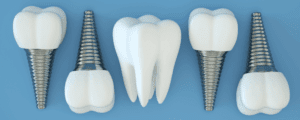Can Dental Implants Fall Out?
Dental implants consist of three main components: the implant itself, which is a small titanium screw that serves as the root of your new tooth; the abutment, a permanent but removable connector that holds and supports the replacement tooth or set of teeth; and the crown, the prosthetic tooth that is visible above the gum line. These implants are designed to mimic natural teeth’ structure and functionality, enhancing the patient’s overall oral health and smile.
One of the most significant benefits of dental implants is their durability. With the right aftercare, dental implants can last a lifetime. However, like any medical procedure, there are potential risks and complications associated with dental implants. Hence, it is vital to understand these factors before proceeding with the treatment.
Can Dental Implants Fall Out?
A question we often get asked at Stella Dental is, ‘Can a dental implant fall out?’ The straightforward answer is yes. However, it is a relatively rare occurrence. Dental implants have a high success rate, with studies showing that about 95% of dental implants are successful. But in some cases, dental implants can fail and eventually fall out.
The process of attaching an implant to the jawbone, known as osseointegration, is crucial for the success of the procedure. This process, which can take several months, involves the implant fusing to the bone, creating a stable base for the new tooth. If osseointegration fails, the implant may become loose and eventually fall out.
In other instances, the implant may seem secure initially but can become loose over time. This usually happens several years after the procedure and can be due to several factors, including poor oral hygiene, excessive biting forces, or complications from systemic diseases.
Reasons Why Dental Implants Might Fall Out
Numerous factors can contribute to dental implant failure. One of the most common reasons is peri-implantitis, a type of gum disease that affects the tissues surrounding the implant. This condition can cause bone loss, leading to a loose implant that may eventually fall out.
Other reasons include insufficient bone density or volume, which can prevent the implant from properly integrating with the bone, and poor oral hygiene, which can lead to infections. Bad habits such as smoking and excessive alcohol consumption can also negatively affect the health of your implants and overall oral health.
Finally, the skill and expertise of the dental professional performing the procedure play a significant role in the success of the implant. At Stella Dental, our dentists are highly trained and experienced in implantology, reducing the chances of implant failure.
Preventive Measures to Avoid Dental Implant Failure
The good news is that there are several preventive measures you can take to reduce the risk of your dental implants falling out. First and foremost, maintaining good oral hygiene is crucial. This includes regular brushing and flossing, regular dental check-ups, and professional cleanings.
Apart from that, leading a healthy lifestyle can significantly improve the success rate of your implant. Avoid smoking and excessive alcohol consumption as these habits can interfere with the healing process and overall health of your oral tissues.
It is also essential to avoid applying excessive pressure or force on the implant, especially during the healing process. This includes avoiding hard or crunchy foods and not using your teeth as tools to open packages or bottles.
What to Do If Your Dental Implant Falls Out
If your dental implant falls out, it is crucial not to panic. Instead, contact your dental professional immediately. At Stella Dental, we offer emergency services to address such situations promptly. It is important not to try reinserting the implant yourself as it could lead to further complications, including infection or damage to the surrounding tissues.
Your dental professional will assess the situation and determine the best course of action. In some cases, the implant can be replaced. In others, additional treatments such as bone grafting may be necessary to ensure the success of the new implant.
Remember, a failed implant is not the end of the world. With the right care and treatment, you can still achieve a beautiful and healthy smile.
Ensuring Successful Dental Implants with Stella Dental
Dental implants have the power to transform smiles and lives, but like any medical procedure, they come with risks. At Stella Dental, we are committed to providing you with the best possible care and ensuring the success of your dental implants. We are here to guide you through the process, from initial consultation to aftercare, ensuring a pleasant and stress-free experience.
If you are considering dental implants or have any concerns about your existing ones, do not hesitate. Book a consultation today, or get in touch with our Stafford Dental team here!




